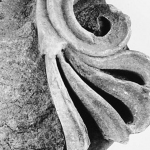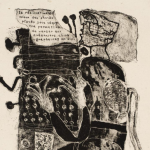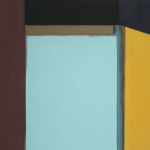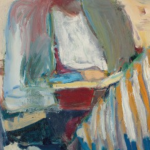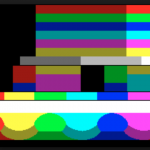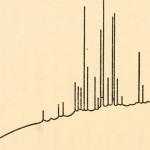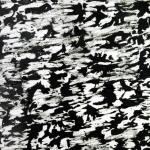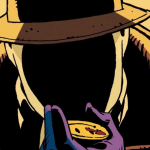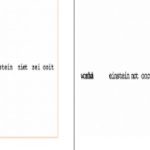Tech-TOC: Complex Temporalities in Living and Technical Beings
Katherine HaylesKatherine Hayles uses Steve Tomasula's multimodal TOC for a significant engagement with the temporal processuality of complex technical beings. Drawing on Bergon's "duration" and its elaboration in recent theories of technicity and consciousness, Hayles explores the complex temporal enfoldings of living and technical beings, showing that Tomasula's new media novel narrates and materially embodies such assemblages.
Flatland in VAS
Lila Marz HarperLila Marz Harper shows the many dimensions of intertextuality between Edwin Abbott's Flatland and Steve Tomasula's VAS. From typography to narratology, Tomasula's "opera in flatland" follows Abbott, in a geometry of fiction that interrogates the biopolitics of today.
“You’ve never experienced a novel like this”: Time and Interaction when reading TOC
Alison GibbonsSteve Tomasula's TOC is hard to explain, according to Alison Gibbons. You're better off experiencing it in all its multimodal and multimedial complexity. Using human computer interaction and narrative theory, Gibbons shows that the emergent, singular, fractured temporality of reading TOC raises the bar for the new media book.
Looking for Writing after Postmodernism
Daniel PundayHouse of Leaves may be on everyone's shortlist of postmodern media-savvy novels, but are we ready for a retrospective collection of essays on Mark Z. Danielewski? According to Daniel Punday's review, Joe Bray and Alison Gibbons' collection says as much about the current state of (post) postmodernist writing as it does about Danielewski's scant oeuvre.
The Latest Word
Curtis WhiteCan a corporate-dominated Web become an environment conducive to literary activity? The novelist, essayist, and cultural critic Curtis White is skeptical. Responding to criticisms of his account of the devolution of literary publishing and reflecting on the prevalence of market-driven values in online exchanges, White doubts whether literature can distinguish itself in the noisy new media ecology, which he likens to a high-tech prison house.
Riposte to Curtis White’s “The Latest Word”
Kate PullingerKate Pullinger's response to Curtis White's "The Latest Word" ploughs ahead. She tells us that writers today may fear for the future of literature but they keep writing, they go on, they must go on.
Blind Hope: A Review of Gregg and Seigworth’s The Affect Theory Reader
Julie ReiserNo need to get excited. According to Julie Reiser, The Affect Theory Reader offers the reader no end of theory but little affect. Reiser suggests this points to a broader and systemic problem in any reading or theory of affect.
Critical Code Studies Week Five Opener – Algorithms are thoughts, Chainsaws are tools
Stephen RamsayStephen Ramsay introduces a short film in which he does a live reading of composer Andrew Sorensen's performance "Strange Places" and provides commentary.
Critical Code Studies Conference- Week Five Discussion
David ShepardDavid Shepard heads off the discussion regarding Stephen Ramsay's live reading of Andrew Sorensen's "Strange Places." His initial contribution is followed with posts by Amanda French, Mark Marino, Max Feinstein, Jeremy Douglass, Daren Chapin, John Bell, Jeff Nyoff, Jennifer Lieberman, and Stephen Ramsay, as well as Andrew Sorensen himself.
New Media: Its Utility and Liability for Literature and for Life
Joseph TabbiThis formulation by Joseph Tabbi is being reprinted with permission from the University of Minnesota Press's remixthebook. The original online version can be found here.
Watching Watchmen: A Riposte to Stuart Moulthrop
Lee KonstantinouIs 'media specific' e-lit criticism nothing but the last gasp of New Criticism and Deconstruction? Lee Konstantinou seems to think so, in this appreciation of the 'astute micro-analyses' (but critique of the theoretical basis) of Moulthrop's close reading/observation of Watchmen.
“Is this for real? Is that a stupid question?”: A Review of Dennis Cooper’s The Sluts
Megan MilksDennis Cooper's disorienting novel, The Sluts, complicates reader expectations about subjectivity and identity. As a result, Megan Milks notes that it "is either the most honest or the most dishonest literature I have come across."
Epic at the End of Empire
Joseph TabbiIn The American Epic Novel, Gilbert Adair presents a "State-of-the-Empire address" that interrogates the epical form in a time where authors no longer talk of writing "The Great American Novel." As Joseph Tabbi finds, such an exploration goes beyond expanding the canon and presents "a new, compelling context for 'the literary' itself."

